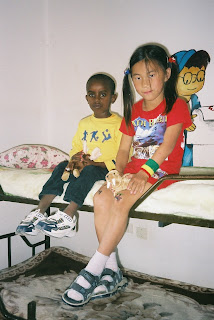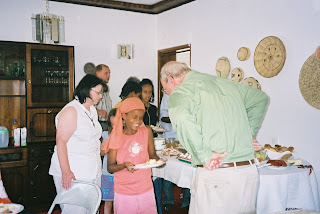"Merry Christmas!" a little elf whispered into my ear at 6:30 this morning.
"Merry Christmas," I mumbled back.
I tried to convince her that we needed to sleep for another hour (seeing as she didn't get to sleep until after 10 last night) but she would have none of that. Stockings were waiting. So I told her she could go peek at them and then should come back to bed. Ha.
Next thing I knew, she had Laolao examinging the stockings with her. Okay, mother, get your butt out of bed. I got up, threw on some basic clothes, and went to see what delights Santa had managed to bring to or find in Ethiopia. Laoye joined us shortly thereafter, so I guess more sleep was out of the question.
After breakfast, Giggles and Laoye went off to buy more buns and investigate a possible restaurant for supper tonight. (Gotta eat out a few times!) While they did so, I showered, dressed properly, and packed the basics for our trip tomorrow. Upon their return, Giggles took me into the street to show me the kitty they'd seen a down the road a ways. The little kitty was no longer there, but a slightly larger one was, so we petted it and fed it some yogurt we'd brought from the kitchen. The people living in the nearby houses all gathered round, exclaiming at these crazy foreigners (or some such – who knows what they were really saying!).
We then began our morning's adventure, to find AHOPE Ethiopia, the orphanage for HIV+ children. I had some general directions and phone numbers, and had been told it wasn't necessary to phone ahead but one could just show up, so that's what we planned on doing. Fasil was busy so sent a friend to drive us. The friend didn't seem to understand the directions – not a good sign. After a few futile attempts at calling the AHOPE phone numbers, I told him to take us to the Weygoss, both because I'd forgotten I wanted to go there first anyhow to leave a message for K & M and in the hopes that someone there might know of AHOPE and be able to provide directions.
The first purpose was accomplished but the second didn't produce much. No one knew of AHOPE, but after some discussion with a few of the staff, the taxi driver at least seemed to know better what general area to go in. So off we went. The ride took us over some bumpy sections where the road was under construction, past some landmarks we'd seen before and beyond. We came to one of the landmarks that was part of the directions I'd received to find the orphanage, and no sign of it. The driver asked one or two people, but again no one knew of it. We found the offices of Save the Children and went in to ask if anyone knew of it, but they were mostly deserted owing to its being (western) Christmas Day and the Ethiopian staff around didn't have any idea. Then I had a brain wave. I called our MCC friends on my mobile phone and asked them for the number of the person they knew who volunteered at AHOPE. I then called him and had him give direcdtions to the taxi driver. We headed back down the main road and had gone about a kilometre when Laolao called out, "AHOPE Ethiopia! There it is!" She'd spotted the small sign by the gate. At last! It had taken us almost two hours to find it.

The guard let us into the gate and we were ushered into the office area, where several people greeted us. One woman gave us the spiel about their mission and work, and then took us on a tour of the compound. We had come to the younger children's compound; there is a second compound for older children, which is about a 10-minute drive away. Some of the children were at school, but those too young for school were at the compound. In one room we saw about a dozen of the littlest ones playing with the nannies; in a different building the three and four-year-olds were learning colours and numbers with another nanny. One very small eight-year-old girl was among them; she had just recently arrived at AHOPE in poor health and was from a region where Amharic is not spoken. She had not yet started school as they wished to improve her health and give her a chance to pick up some basic Amharic first.
One of the children had several noticeable sores on his face; the staff said he was a relatively recent arrival as well and had been in much worse condition, but that with proper medical care he was doing much better. For these children, good nutrition is essential as their bodies are weakened by the need to fight the HIV virus, and they are more susceptible to other germs and diseases. Once the HIV medications have taken effect and brought the virus under control, their bodies have greater resources to fight off other infections.
We didn't stay long, but I had wanted to see the place where many of our donations were destined and to be able to tell the people who gave items what we had seen.
As we departed, the taxi driver told me that he was very happy we had found the place – I think he was concerned about giving good service. He also gave me some corrections to the directions I had been given, which had been a source of the confusion as the version I had didn't make much sense.
It was 1:00 by the time we got home. We ate a light lunch of Christmas chicken soup (that had been simmering on the stove most of the morning) and had some time to play, read, nap, and go pet the cats again before adventure number two.
At 3:30, Daniel from the Kid's Hope project showed up at our door. We loaded up the last two of our donation suitcases and he took us into yet another new part of town. This project was housed down a maze of narrow, rough gravel streets off a main road. The director, Besret, showed us the library and computer rooms, which are the main physical features of their premises.
This project is operated with the partnership of Canadian Humanitarian and focuses on providing support so that orphans or "half-orphans" can remain in their community and continue to be cared for by their community and to receive education. They have tutors who support the students in their studies, assisting with homework and providing extra instruction in literacy, math, science and other subjects, including English. The library, by our standards, would seem very basic, but it probably houses more books than many of these students would ever have a chance to see.
The computer room, in contrast, is a marvel. Four modern computers are used to teach twelve students at a time basic computer skills. Four more computers with internet connection will soon be added to the library, providing older students with the ability to do e-research (providing they know enough English, though it may also provide an incentive and means to learn more English).
The project also works with the children's caregivers, usually extended family, to assist them with income generation, skills development, and development of good health and hygiene habits. While we did not meet any of the students, we were told of several who came out of very disadvantaged circumstances and were using this opportunity to better themselves and make changes in their lives. The community among whom this project is working are among some of the most marginalized in the city, we were told.
To finish off this Christmas with a difference, we headed back to the Weygoss where we'd arranged to meet K & M for supper. A short walk took us to an Italian restaurant with prices that were not bad (for North American pockets). We had a nice time chatting (though K in particular was having trouble staying awake, having just finished a two-day journey from Canada and before that several fretful nights of anticipation!). They had met their little girl today and had seen Poppet at the TH, too – he was apparently all smiles again! Tomorrow they are heading on an excursion out of town to meet birthfamily, while we are headed off for some more sightseeing before completing our family unification.
(Continue to 26 December: Awassa)



























































